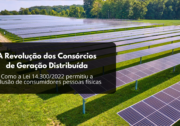Why should governing authorities be thinking about disruption in the energy sector?
In this review, I intend to analyze the result of thoughts and discussion among the authors Michelle Hallack and David Lopez about the potential disruption in the energy sector published on Florence School of Regulation’s website. No one knows where the disruption in the energy sector can take us in the future. The change of […]
In this review, I intend to analyze the result of thoughts and discussion among the authors Michelle Hallack and David Lopez about the potential disruption in the energy sector published on Florence School of Regulation’s website.
No one knows where the disruption in the energy sector can take us in the future. The change of the status quo can yield consumers a lot of benefits but, on the other hand, it will require new public policies.
How shall public policies and disruption in the energy sector work together?
According to the authors, Michelle Hallack and David Lopez, a well-functioning energy industry relies on relatively long periods of investments, and for that, it is essential to consider how demand and policies can develop.
Since 1970, the energy industry has gone through important trends such as policy shifts, environmental concerns and economic recessions. When it comes to politics, the industry witnessed two important events: (1) the concentration of electricity supply in a few companies postwar and (2) from 1980 onward a movement of competition in the energy industry initiated. Both events are associated with technological transformation.
What kinds of challenges does transformation bring to the electricity sector?
Despite not knowing how clear a new transformation in the energy industry will be, we know that a disruption in this sector will change the functioning of the electricity system. We are undergoing a transition from a centralized power system to a decentralized one. See, for example, rooftop energy generation and other types of net metering systems.
In many places throughout the world, it is already possible for residential and commercial customers to generate their own electricity from solar power plants and other sources of energy (e.g. small hydro plants, waste plants, etc).
As stated by the authors, many countries have passed net metering laws, but different interests involved in this process require further changes in policies and regulations to solve two challenges: (a) cost allocation problem and (b) disruption potential.
The first challenge requires an urgent change in the method for pricing the use of the energy supply services and keep the best service for the customers. The net metering systems have as consequence a decrease in the income of the distribution companies and it can impact public utility services.
The second public policy challenge is how governing authorities should plan new services in a distributed economy and a disruptive environment.
Disruption is largely costly because it requires to produce new laws and regulations and long-term investments. Policymakers and regulators need to think of new set tools to grant adaptation while maintaining the believability and predictability of the power system.
Furthermore, this movement can be contradictory. For developing countries, with a lower level of innovation, the cost for an institutional preparation for potential disruption would be too high. On the other hand, in countries with a higher level of innovation it will be developed more quickly and with fewer costs.


